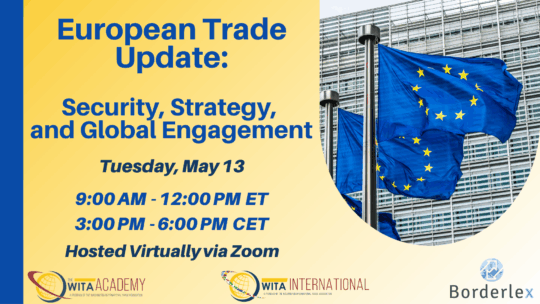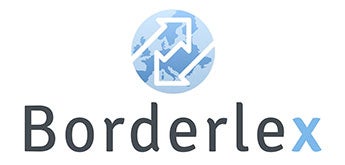As the global economy faces increasing instability and geopolitical tension, the European Union is adapting its trade strategy to manage risk, assert its global role, and diversify its partnerships. This Mini Intensive Trade Seminar, hosted by the WITA Academy, WITA International and Borderlex, provides a timely update on the EU’s trade priorities. Featuring experts from Europe and beyond, this program explored the EU’s economic and regulatory toolkit, its response to geopolitical shocks, and its agenda for new trade agreements and market diversification.
Registration for the Mini Intensive Trade Seminar was open to the public and all sessions are off-the-record/Chatham House Rules.
If you cannot attend every session in real time, a link to the recording will be sent to all registered attendees to watch on your time on a password protected site.
Program Agenda and Speakers
9:00–9:20 AM ET / 3:05–3:20 PM CET:
Discussion with Tomas Baert, Trade Advisor to Ursula von der Leyen, European Commission
9:20–10:10 AM ET / 3:20–4:10 PM CET:
Session 1: Geopolitical Turbulence, Trade, and Europe’s Global Role
Ignacio Garcia Bercero, Non-resident fellow, Bruegel; former Director, Directorate for Trade at the European Commission
Shada Islam, Founder and Director, New Horizons Project Geopolitical; Non-Resident Fellow, Center for Global Development
Hosuk Lee-Makiyama, Director, European Centre for International Political Economy (ECIPE)
Moderator: Iana Dreyer, Founder and Editor, Borderlex
10:10–11:00 AM ET / 4:10–5:00 PM CET:
Session 2: Europe’s Economic Security Toolkit
Jacob Kirkegaard, Nonresident Senior Fellow, Peterson Institute for International Economics (PIIE); Senior Fellow, Bruegel
Peter Sandler, Director for Enforcement, Market Access, SMEs, Legal Affairs and Technology, European Commission
Nina Spieler, Associate, Global Regulatory, Hogan Lovells
Moderator: Georgia Tzifa, Counsel, WilmerHale
11:00–12:00 PM ET / 5:00–6:00 PM CET:
Session 3: EU’s Trade Negotiations, Agreements and Diversification Plans
Discussion with Sabine Weyand, Director-General, Trade and Economic Security, European Commission
David Henig, Director, UK Trade Policy Project, European Centre for International Political Economy (ECIPE)
Peter Bay Kirkegaard, Leading Senior Advisor, DI – Confederation of Danish Industries
Nicolas Köhler-Suzuki, Associate Researcher, Jacques Delors Institute
Moderator: Penny Naas, Lead GMF Allied Strategic Competitiveness, German Marshall Fund of the United States
Speakers Biographies
Tomas Baert, Trade Advisor to Ursula von der Leyen, European Commission
Tomas Baert is a member of cabinet of European Commission President Ursula von der Leyen’s since September 2022. As the President’s trade advisor, he oversees the Commission’s work on trade policy, economic security, and international
competitiveness. His focus includes advancing the conclusion of key EU trade agreements — such as those with Mercosur, Mexico, and India — as well as managing the EU’s trade relations with major global partners, including the United States and China.
From 2018 to 2022, Tomas was based in Washington, DC as Head of Unit for Trade, Agriculture, and Digital Economy at the EU Delegation to the United States, where he managed transatlantic trade relations and helped launch the EU-U.S. Trade and Technology Council. Before his role in Washington, he headed the Trade Strategy unit at the European Commission’s Directorate-General for Trade in Brussels, overseeing the EU’s Trade for All strategy.
Between 2014 to 2016, Tomas was an assistant to the Director-General for Trade, advising on multilateral and EU-U.S. trade negotiations (TTIP). He was based in Geneva from 2010 through 2014 to represent the EU at the WTO, where he coordinated the EU’s participation to the WTO’s 9th Ministerial Conference in Bali. He joined the Commission in 2005 as a negotiator on services trade and investment in DG Trade, working on trade agreements with India, Korea, and Ukraine and, in 2009, led the coordination of the EU’s new investment policy as the Union gained exclusive competence on foreign direct investment.
Tomas holds an MSc from the London School of Economics (LSE) and an MA from the Catholic University of Leuven (KUL). He spent a term at the Graduate Institute in Geneva and completed Harvard Kennedy School’s Mastering Trade Policy program.
Iana Dreyer, Founder and Editor, Borderlex
Iana is the founder and editor of Borderlex. She launched Borderlex in 2014 and remains its driving force. Iana has deep international trade policy expertise spanning over fifteen years.
Iana steers Borderlex’s editorial activities and particularly likes to write about the politics shaping EU trade policy, systemic issues at the World Trade Organization, international trade disputes, the nexus between security and trade and EU-Asian trade relations.
Before launching her publishing activity in London, Iana worked as policy analyst in think tanks with a focus on international trade and international energy policy, consulting on occasion for governments. Iana has worked with the European Centre for International Political Economy, the Institute Montaigne and the EU Institute for Security Studies. Iana has also worked for the Financial Times group and trained in journalism. Iana has post-graduate degrees from the London School of Economics and Sciences Po in Paris.
Ignacio García Bercero, Non-resident Fellow, Bruegel
Ignacio García Bercero is a Non-Resident Fellow at Bruegel.
Active at the European Commission since 1987, he participated in the Uruguay Round negotiations and was subsequently posted in the EU Delegation to the United Nations in New York. Upon his return to Brussels he worked in the preparation of what eventually became the Doha Development agenda and was head of unit for legal affairs and WTO dispute settlement.
From 2005 until 2011 he was Director responsible for the areas of Sustainable Development, Bilateral Trade Relations (South Asia, South-East Asia, Korea, Russia and ex-CIS countries, EuroMed and the Middle East). He was also the Chief Negotiator for the EU-Korea and EU-India Free Trade Agreements. From 2012 he was responsible for overseeing EU activities in the field of Neighbouring countries, US and Canada and was Chief negotiator for the Transatlantic Trade and Investment Partnership.
Mr García Bercero has written several papers and publications on WTO matters, including WTO reform, Dispute Settlement, Competition Policy and Regulatory Cooperation
In 2020 he completed a Fellowship at Saint Anthony’s College Oxford where his research focused on WTO reform. Since 2021 he is Visiting Professor in the Department of Political Science of the University College London and Visiting Senior Fellow at LSE Ideas, London School of Economics and Political Science.
Mr García Bercero holds a Law Degree from the Law Faculty of Universidad Complutense, Madrid and a Master of Laws Degree (with Distinction) from University College, London.
David Henig, Director, UK Trade Policy Project, European Centre for International Political Economy (ECIPE)
David Henig is the Director of the UK Trade Policy Project. A leading authority on the development of UK Trade Policy post Brexit, he places this in the context of developments in EU and global trade policy on which he also researches and writes.
David joined ECIPE in 2018 having worked on trade and investment issues for the UK Government for a number of years, in particular engaging extensively on US-EU talks around the proposed Transatlantic Trade and Investment Partnership, on global issues around the US and China, and latterly helping to establish a UK trade policy capability after the 2016 Brexit referendum. He also writes a regular column for the online trade policy professionals news service Borderlex, advises a Parliamentary committee and the UK Trade and Business Commission, and appears regularly in media and at events to discuss latest developments. During the most intense phases of Brexit, he established with a number of other UK specialists a network of expertise under the UK Trade Forum banner.
Prior to working in Government, David worked in consulting and business development, having graduated from Oxford University. Collectively all of this experience is brought together in the project examining and evaluating the UK’s performance in preparing for and delivering effective trade policy.
Shada Islam, Founder and Director, New Horizons Project
Shada Islam is the founder and Director of New Horizons Project. She is a renowned and respected Brussels-based commentator on European Union affairs who now works independently as an advisor/analyst on Europe, Africa, Asia, geopolitics, trade, and inclusion.
Islam worked for nine years as Director of Europe and Geopolitics at Friends of Europe, an influential independent think tank based in Brussels.
She has spent most of her professional life researching, writing and speaking about the European Union’s relations with Africa, Asia and EU Development Policy, building up a global reputation as a leading commentator, analyst and writer as well as a fresh and original thought-leader on EU relations with emerging nations.
At Friends of Europe, Islam started and expanded the Asia Programme and was a key driver of the organisation’s Development Policy Forum which brings together leading European and international development agencies.
She played a crucial role in discussions on Africa, including within the High Level Group of European and African Personalities co-organised by FoE with the Mo Ibrahim Foundation and the One Campaign.
Last year, she was selected as one of the 20 most influential women in Brussels by the magazine Politico. She is also a Solvay Fellow at the Vrije University Brussel (VUB).
As a correspondent for over 20 years for several Asian and African leading media outlets including “The Far Eastern Economic Review”, West Africa Magazine and the BBC African Service, Islam has acquired an in-depth knowledge and unique insights into the policies and priorities of governments, business and civil society actors in Europe, Africa and Asia.
As such, her opinions and advice are much sought-after by African, Asian and European governments, including the European Union institutions and the European External Action Service as well as business, civil society and academia.
She is a regular speaker at international conferences and is a frequent lecturer at academic symposia in Africa, Asia and Europe and is often interviewed by international media.
Islam joined Friends of Europe in February 2011, working there until June 9, 2020. While at FoE, she organised several high-level conferences and seminars on development policy, Africa and Asia.
Earlier, after working as a senior journalist and commentator, Islam joined the European Policy Centre think tank in Brussels in 2007. She has a Masters Degree in Journalism and Social Communication from the Universite Libre de Bruxelles.
Peter Bay Kirkegaard, Senior Adviser, Confederation of Danish Industry (DI)
Mr. Peter Bay Kirkegaard is Senior Adviser on trade policy at the Confederation of Danish Industry, where he has been employed since 2008.
The Confederation of Danish Industry is the largest business organization in Denmark with around 10.000 companies that are direct members of the organization.
Mr. Kirkegaard holds masters in Political Science, University of Aarhus, Denmark, 2001. Prior to working for the Confederation of Danish Industry, he has worked at the Danish Commerce and Companies Agency, as well as for the World Bank and the regulatory reform consultancy company, Jacobs, Cordova and Associates
Jacob Kirkegaard, Nonresident Senior Fellow, Peterson Institute for International Economics (PIIE); Senior Fellow, Bruegel
Jacob Funk Kirkegaard has been nonresident senior fellow with the Peterson Institute for International Economics (PIIE) since September 2020 and resident senior fellow with Bruegel since September 2024. He was a resident senior fellow with the German Marshall Fund of the United States (GMF) in the GMF’s Brussels office from September 2020 to August 2024. He has been associated with the Institute since 2002 and had been resident senior fellow from 2013 to 2020.
Before joining the Institute, he worked with the Danish Ministry of Defense, the United Nations in Iraq, and in the private financial sector. He is a graduate of the Danish Army’s Special School of Intelligence and Linguistics with the rank of first lieutenant; the University of Aarhus in Aarhus, Denmark; the Columbia University in New York; and received his PhD from Johns Hopkins University, School of Advanced International Studies. He is coeditor of Transatlantic Economic Challenges in an Era of Growing Multipolarity (2012), author of The Accelerating Decline in America’s High-Skilled Workforce: Implications for Immigration Policy (2007), coauthor of US Pension Reform: Lessons from Other Countries (2009) and Transforming the European Economy (2004), and assisted with Accelerating the Globalization of America: The Role for Information Technology (2006). His current research focuses on European economies and reform, immigration, foreign direct investment trends and estimations, pension systems, demographics, offshoring, and the impact of information technology.
Nicolas Köhler-Suzuki, Associate Researcher, Jacques Delors Institute
Nicolas is an Associate Researcher at the Jacques Delors Institute. He is an experienced policy advisor on international trade and the principal of International Trade Intelligence. He has worked with international organisations and national governments and provided expertise on the negotiation and implementation of multilateral and regional trade agreements.
Prior to his advisory work, Nicolas was a doctoral researcher at the University of Cambridge with a focus on Indian trade agreements. He holds an MPhil in International Relations from the University of Cambridge and studied politics, economics, and law at the University of Münster, Germany, and McGill University, Canada. Nicolas has worked on trade and development at the United Nations in Geneva, at the European Commission in Brussels, at the German Bundestag in Berlin, and at the German Corporation for International Cooperation in Lilongwe.
Hosuk Lee-Makiyama, Director, European Centre for International Political Economy (ECIPE)
Hosuk Lee-Makiyama is the director of European Centre for International Political Economy (ECIPE) and a leading author on trade diplomacy, EU-Far East relations and the digital economy.
He is regularly consulted by governments and international organisations on a range of issues, from trade negotiations to economic reforms. He appears regularly in European, Chinese and US media, and is noted for his involvement in WTO and major free trade agreements. He was also named “One of the 20 most influential people for open internet” by the readers of the Guardian UK in 2012. He was the first author to argue for a WTO case on internet censorship in China.
Prior to joining ECIPE, he was an independent counsel on regulatory affairs, competition and communication, Senior Advisor at the Ministry of Foreign Affairs, representative of Sweden and the EU member states towards the WTO and the UN, including WIPO and UNECE. Lee-Makiyama is also a Fellow at the department International Relations at the London School of Economics, and currently shares his time between LSE and ECIPE.
Penny Naas, Lead, GMF Allied Strategic Competitiveness, German Marshall Fund of the United States
Penelope (Penny) Naas is Lead at GMF Allied Strategic Competitiveness. She is a global public policy leader who designs strategies on international economic issues that sit at the nexus of geopolitics, trade, and climate. She is an adviser for TradeExperettes, a global organization of women trade experts.
Naas has created innovative strategies and solutions for Citigroup and, more recently, for UPS as its president for international public affairs and global sustainability. She opened and was managing director of Citigroup’s first government affairs office in Brussels between 2007 and 2012 before leading UPS’s international team from 2012 to 2019. She started her career at the US Department of Commerce, where she worked for 13 years on international economic issues and advancing the commercial interests of US companies in Europe.
Naas holds a bachelor’s degree in economics and a master’s degree in public policy from the University of Michigan, Ann Arbor. She is on several boards and has co-chaired the World Economic Forum’s Global Future Council on Trade and Investment.
Peter Sandler, Director for Enforcement, Market Access, SMEs, Legal Affairs and Technology, European Commission
Peter works is a Director for Enforcement at the European Commission’s Trade Department, focused for the last three years on economic security, enforcement and legal affairs. That work includes export controls, trade sanctions and inbound and outbound investment.
He has spent most of his career “building” Europe from the inside, having graduated as a lawyer from Bristol University in the UK and the College of Europe in Bruges. He joined the Commission in 1992. He has worked on various economic reform themes during his career from openning up Europe’s telecoms markets in the 90s to being a Commission spokesperson for the information society and business in the Prodi Commission, He was policy assistant to the Commission’s Secretary General. He joined DG Trade in 2008, and prior to his current role was Director for Policy Coordination, Inter-institutional relations, Communications and Resources.
Nina Spieler, Associate, Global Regulatory, Hogan Lovells
Nina is an Associate at Hogan Lovells where she advises companies, governments, and trade associations on international trade, EU law and investment rules, specializing in EU law and environmental law. She provides guidance on all aspects of export controls, subsidies, sanctions, customs, product standards and trade policy, particularly in relation to EU market access.
Nina assists clients in navigating all aspects of EU trade controls and trade defense, including anti-subsidy (FSR), anti-dumping and safeguard measures. She represents clients in investigations and defense proceedings, including before the European Commission and EU and Member States Courts. Nina has extensive experience advising on export controls, including securing licenses, conducting investigations, coordinating with customs authorities and developing compliance. She regularly provides guidance to clients on complex Russia sanctions issues.
In addition to trade defense and export controls, Nina assists clients with supply chain due diligence and reporting requirements and forced labor regulations, and the compliance of EU trade measures with EU treaties and WTO rules.
Her industry expertise spans sectors including automotive, pharmaceuticals, food, medical devices, aviation, and financial services.
Her experience includes advising governments and municipalities on free trade agreements, climate change adaptation policies and multilateral environmental agreements. She has participated in UN negotiations, providing legal advice on international law and negotiation proposals.
Nina holds an LL.M. from Harvard Law School and is fluent in German, French, and English.
Georgia Tzifa, Counsel, WilmerHale
Georgia Tzifa is a Counsel at WilmerHale where she specializes in EU competition and regulatory law. Her practice also covers international trade law and EU litigation.
Ms. Tzifa represents clients in complex merger proceedings before the European Commission and advises in global cartel investigations (adverse and settlement procedures). Her practice covers a broad range of industry sectors, including automotive, aviation, electronics, energy and maritime. She has also represented corporate and institutional clients before the European Court of Justice in a variety of cases (inter alia in areas, such as banking law, State aid and institutional law).
Ms. Tzifa regularly advises on international trade law, including import and export restrictions, special customs regimes and tariff measures. Her practice also covers the application of restrictive measures and sanctions, as well as conflict of laws issues stemming from blocking legislation.
Before joining WilmerHale, Ms. Tzifa completed a Blue Book traineeship in a cartels unit of the European Commission’s Directorate General for Competition. Prior to that, she worked as an associate at a leading Greek law firm specializing in competition law, public procurement and commercial litigation, as well as a research assistant in the fields of European and comparative constitutional law at the University of Athens.
Ms. Tzifa publishes regularly on various EU law topics and is a member of the Board of Editors of Nomiko Vima, the law journal of the Athens Bar Association.
Sabine Weyand, Director-General, Trade and Economic Security, European Commission
Sabine Weyand is Director-General for Trade for the European Commission.
She was Deputy Chief Negotiator of the Commission Task Force for the Preparation and Conduct of the Negotiations with the United Kingdom under Article 50 of the TEU from October 2016 to May 2019.
She joined the European Commission in 1994 where she worked on industry and trade issues before serving in the Cabinets of Trade Commissioner Pascal Lamy and Commission President Barroso and heading the private office of Development Commissioner Louis Michel.
She then became Director in the Secretariat-General of the Commission in charge of policy coordination on economic, social and environmental policies before joining DG Trade in 2016 as Deputy Director-General, covering multilateral trade policy, trade relations with North America and European neighbourhood countries as well as trade defence.
She holds an M.A. degree in political science and economics from Freiburg University (DE), a Master’s degree from the College of Europe and a Ph.D. from Tübingen University (DE).
Prices and Registration:
WITA Member: $50
Non-WITA Member: $100
Free for Embassy, Ministry, and Government Officials from All Countries
(Must register with official government email)
Free for Full Time Students (Must register with university email)
For group rates (3 or more ticket purchases), email Diego Añez (danez@wita.org) to receive a special rate.
Thanks to the generous support of our WITA Academy sponsors, we are pleased to announce that registration for the upcoming Intensive Trade Seminar will be free for U.S. government officials, state officials and free for full-time students.
In addition, embassy and ministry officials from foreign governments may attend for free thanks to the support of our WITA International sponsors.
Who Should Attend?
- International trade professionals and policymakers at the federal, state, and local levels seeking to understand the EU’s economic security strategies and their impact on transatlantic relations.
- Corporate leaders and industry experts in key sectors like technology, manufacturing, energy, and agriculture navigating the challenges and opportunities presented by EU trade policies and regulations.
- Embassy and ministry officials from around the world covering EU trade or member-state policies, aiming to deepen their understanding of Brussels’ policymaking ecosystem and its global implications.
- Law firms and legal professionals advising clients on international trade, export controls, FDI screening, and compliance with EU regulations.
- Multinational corporations and trade teams managing transatlantic operations or supply chains impacted by the EU’s industrial and trade policies.
- Chambers of commerce, trade associations, and industry groups representing businesses affected by EU economic security policies and promoting international trade cooperation.
- Academics, researchers, and students in trade policy, international relations, law, or economics eager to understand how the EU formulates trade policy and its global impacts.
Why Attend?
- Understand the EU’s trade policy ecosystem, including its unique legislative and institutional processes.
- Learn about the latest EU regulatory developments and how they impact U.S. stakeholders and allies.
- Discover opportunities for collaboration and innovation between the U.S. and EU in areas like technology, supply chains, and trade diplomacy.
About Intensive Trade Seminar
For more than a decade, WITA’s Intensive Trade Seminar (ITS) has been a cornerstone program, educating government officials, private sector professionals, and the public on how to navigate the Washington and international trade policy landscape.
ITS sessions cater to a diverse audience, including policymakers, trade professionals, corporate leaders, legal advisors, and students, providing practical knowledge of trade policy mechanics and fostering connections within the trade community.
In addition to the flagship program on American trade policy making, WITA offers ITS sessions on hot-button issues and specific trade topics, delivering in-depth education that supports a deeper understanding of trade policy.
About Borderlex
Borderlex is the go-to resource for news, analysis, commentary, insights, in-depth technical analysis on trade policy and free trade negotiations in Europe.
Their main focus is European Union trade policy in Europe, Britain’s post-Brexit trade policy and key World Trade Organization developments. They are the only comprehensive news outfit on trade policy based in the EU.
Borderlex was born as a blog in May 2014 and turned into a professional news site in 2016. Since then it has established a firm reputation for providing reliable news, and solid, predictive, and critical analysis on European trade and investment policy.
Thank you to our WITA International Partner
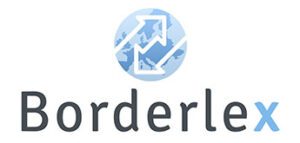
Thank you to our WITA Academy Sponsors
Thank you to our WITA International Sponsors
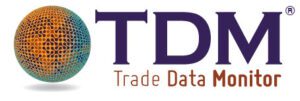 |
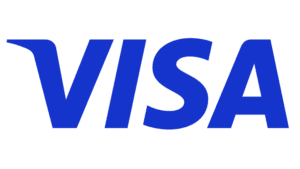 |
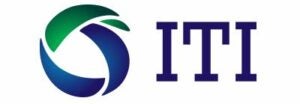 |


